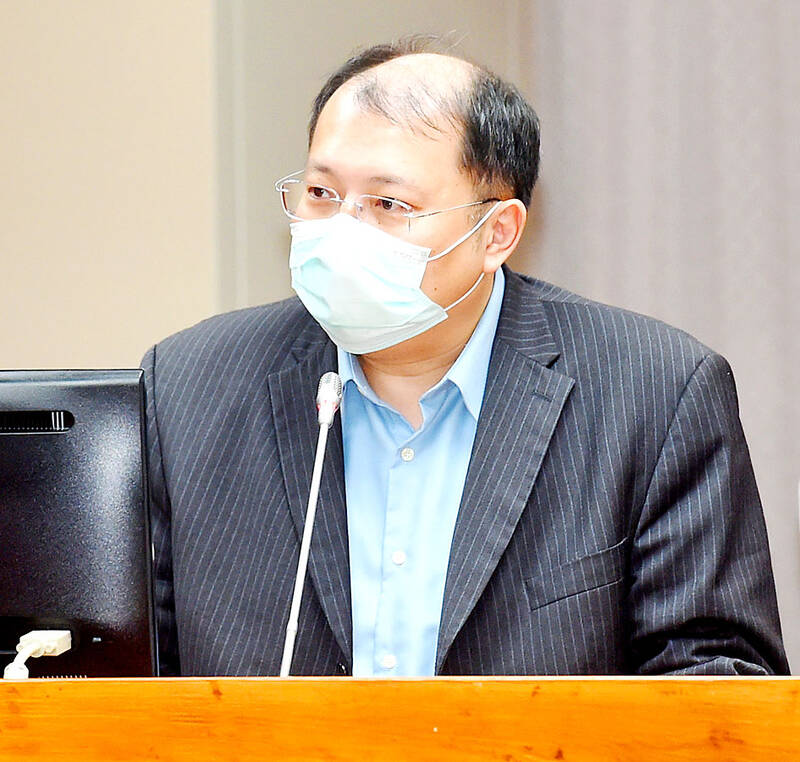Taiwanese and US security officials discussed how Taiwanese companies could adopt key US defense supply chain standards during a rare meeting on US soil in April, a senior government official said.
Deputy Minister of Digital Affairs Chiueh Her-ming (闕河鳴) met with representatives of the US National Institute of Standards and Technology (NIST) at the Taipei Economic and Cultural Office in San Francisco, the official said, asking not to be identified because they were not authorized to discuss security matters publicly.
The working-level meeting, organized by the American Institute in Taiwan, discussed the possibility of Taiwanese companies incorporating a US government cybersecurity standard called NIST 800-171, the official said.

Photo: Chu Pei-hsiung, Taipei Times
The standard is meant to protect the confidentiality of data labeled as “controlled unclassified information,” NIST said.
Chiueh met the NIST officials during a trip that included attending a security conference in San Francisco and meeting with representatives of major technology companies, the Ministry of Digital Affairs said in a statement.
The US is stepping up security support for and cooperation with Taiwan as Chinese President Xi Jinping (習近平) puts increased military pressure on the nation.
Ensuring that Taiwanese companies meet US defense supply chain standards would strengthen security ties between the two governments.
US defense contractors are generally required to comply with a range of key cybersecurity standards, which include the latest version of the Cybersecurity Maturity Model Certification, a program to safeguard sensitive information.
Other regional strategic partners of the US, such as Japan and South Korea, have already pushed their defense companies to seek the certification.
The Taiwanese delegation of nearly 20 officials and researchers on information security and defense discussed 5G communications and low Earth orbit satellites during the meeting.
Taiwan is preparing for the worst-case scenario of the destruction of its telecommunications and power lines in the event of an invasion by Beijing, Minister of Digital Affairs Audrey Tang (唐鳳) said in an interview last month.

‘DENIAL DEFENSE’: The US would increase its military presence with uncrewed ships, and submarines, while boosting defense in the Indo-Pacific, a Pete Hegseth memo said The US is reorienting its military strategy to focus primarily on deterring a potential Chinese invasion of Taiwan, a memo signed by US Secretary of Defense Pete Hegseth showed. The memo also called on Taiwan to increase its defense spending. The document, known as the “Interim National Defense Strategic Guidance,” was distributed this month and detailed the national defense plans of US President Donald Trump’s administration, an article in the Washington Post said on Saturday. It outlines how the US can prepare for a potential war with China and defend itself from threats in the “near abroad,” including Greenland and the Panama

A wild live dugong was found in Taiwan for the first time in 88 years, after it was accidentally caught by a fisher’s net on Tuesday in Yilan County’s Fenniaolin (粉鳥林). This is the first sighting of the species in Taiwan since 1937, having already been considered “extinct” in the country and considered as “vulnerable” by the International Union for Conservation of Nature. A fisher surnamed Chen (陳) went to Fenniaolin to collect the fish in his netting, but instead caught a 3m long, 500kg dugong. The fisher released the animal back into the wild, not realizing it was an endangered species at

The High Prosecutors’ Office yesterday withdrew an appeal against the acquittal of a former bank manager 22 years after his death, marking Taiwan’s first instance of prosecutors rendering posthumous justice to a wrongfully convicted defendant. Chu Ching-en (諸慶恩) — formerly a manager at the Taipei branch of BNP Paribas — was in 1999 accused by Weng Mao-chung (翁茂鍾), then-president of Chia Her Industrial Co, of forging a request for a fixed deposit of US$10 million by I-Hwa Industrial Co, a subsidiary of Chia Her, which was used as collateral. Chu was ruled not guilty in the first trial, but was found guilty

DEADLOCK: As the commission is unable to forum a quorum to review license renewal applications, the channel operators are not at fault and can air past their license date The National Communications Commission (NCC) yesterday said that the Public Television Service (PTS) and 36 other television and radio broadcasters could continue airing, despite the commission’s inability to meet a quorum to review their license renewal applications. The licenses of PTS and the other channels are set to expire between this month and June. The National Communications Commission Organization Act (國家通訊傳播委員會組織法) stipulates that the commission must meet the mandated quorum of four to hold a valid meeting. The seven-member commission currently has only three commissioners. “We have informed the channel operators of the progress we have made in reviewing their license renewal applications, and